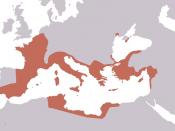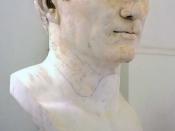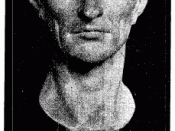"Behind every event is a reason; at the forefront of every reason is man (Aristotle, 384 - 322 BC)" In Julius Caesar, Shakespeare supports this notion; the most notable events - namely, the murder of Caesar, the civil war, and the deaths of other key characters - result from two character flaws. One is the inability of some characters to construct a realistic image of themselves, and understand their weaknesses. The fact that the characters are so easily manipulated also results in a number of unfavourable events. First, Cassius is able to persuade Brutus to kill Caesar. Without such support, the assassination is unlikely to occur. Caesar's false sense of infallibility and his susceptibility to Decius' flattery also causes his ruin. Following Caesar's murder, an uprising results from Antony's manipulation of the Roman citizens. Then, the subplot ends with Brutus' suicide, because he is horrified that he lacked the knowledge to see his true self.
Cassius wants to murder Caesar to seize more power for himself. To accomplish his cause, he manipulates the simplicity of others to assemble a group of conspirators. Brutus is motivated by loyalty to the state rather than by personal relationships. Seeing that Brutus might be open to what he has to say, Cassius tries to persuade Brutus to help murder Caesar. Cassius recognizes that the only way to get Brutus to kill his friend is to convince him (Brutus) that it would be for the good of Rome. So, Cassius writes some false letters, stating the fear of citizen's about Caesar's leadership. Brutus receives the warnings in the letters and subsequently decides that Caesar must be killed. That Brutus is so easily swayed is exemplified by Cassius' confidence that Brutus will join the plot. As Cassius asserts, "three parts of him/Is ours already,



Good
This is an excellent essay. Sophisticated use of quotes can never go wrong and great analysis throughout.
5 out of 5 people found this comment useful.